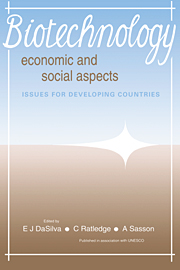Book contents
- Frontmatter
- Contents
- List of contributors
- Preface
- 1 Biotechnology: the socio-economic revolution? A synoptic view of the world status of biotechnology
- 2 Bioethanol production: economic and social considerations in failures and successes
- 3 Biofertilizers: agronomic and environmental impacts and economics
- 4 Microalgal biotechnology: is it an economic success?
- 5 Production of useful biochemicals by higher-plant cell cultures: biotechnological and economic aspects
- 6 Mushroom production – an economic measure in maintenance of food security
- 7 The economic viability of Single Cell Protein (SCP) production in the twenty-first century
- 8 The impact of biotechnology on international commodity trade
- 9 Biotechnology: socio-economic considerations, intercultural perspectives and international viewpoints
- 10 Joint microbial biotechnological ventures in developing countries: social promises and economic considerations
- 11 The economic and social implications of gene technology to developing countries
- 12 Making biotechnology appropriate – and environmentally sound
- 13 Information support for research and development in biotechnological applications
- 14 The effects of emerging biotechnologies on plant and animal agriculture – a viewpoint
- Index
12 - Making biotechnology appropriate – and environmentally sound
Published online by Cambridge University Press: 04 August 2010
- Frontmatter
- Contents
- List of contributors
- Preface
- 1 Biotechnology: the socio-economic revolution? A synoptic view of the world status of biotechnology
- 2 Bioethanol production: economic and social considerations in failures and successes
- 3 Biofertilizers: agronomic and environmental impacts and economics
- 4 Microalgal biotechnology: is it an economic success?
- 5 Production of useful biochemicals by higher-plant cell cultures: biotechnological and economic aspects
- 6 Mushroom production – an economic measure in maintenance of food security
- 7 The economic viability of Single Cell Protein (SCP) production in the twenty-first century
- 8 The impact of biotechnology on international commodity trade
- 9 Biotechnology: socio-economic considerations, intercultural perspectives and international viewpoints
- 10 Joint microbial biotechnological ventures in developing countries: social promises and economic considerations
- 11 The economic and social implications of gene technology to developing countries
- 12 Making biotechnology appropriate – and environmentally sound
- 13 Information support for research and development in biotechnological applications
- 14 The effects of emerging biotechnologies on plant and animal agriculture – a viewpoint
- Index
Summary
Biotechnology, of which microbial technology is a crucial component, promises massive new interventions in health and agriculture in developing countries (Walgate, 1990).
For example, vaccines are now being developed for 28 diseases, including scourges such as malaria, which kills a million people – mostly children – every year in Africa alone. Yet since Louis Pasteur developed his vaccine against rabies in 1885, just 21 other vaccines have been produced. Just nine of the 22 are now used routinely against childhood diseases. The average rate of invention of routinely used vaccines has thus been less than one per decade. With biotechnology – using genes of the pathogenic microorganisms spliced into genomes of other, relatively benign bacteria and virusus – vaccine development rates are thus increased more than 20-fold.
In agriculture, virus-free cassava – produced by tissue culture, or by the engineering in of viral genes expressing the coat protein of cassava mosaic viruses – could doubly secure rural African calorie production; and hybrid rice, new wide crosses and perhaps engineered pest-resistant rice – and rice with new endophytic bacteria engineered to kill pests – could provide the extra 45 per cent rice production that Asia needs by the year 2000. Or so biotechnologists claim. What is needed is a more sober, human context for such claims. At the political level, the target should not be to build a capability in biotechnology at all costs but to alleviate poverty – which is surely the principal goal of development – and to see where biotechnology might help.
- Type
- Chapter
- Information
- Biotechnology: Economic and Social AspectsIssues for Developing Countries, pp. 284 - 308Publisher: Cambridge University PressPrint publication year: 1992

